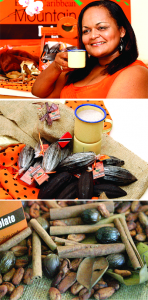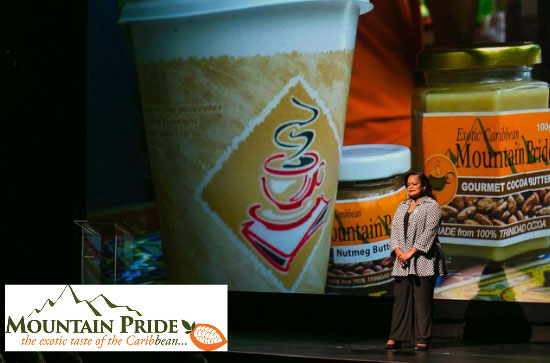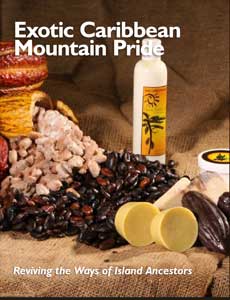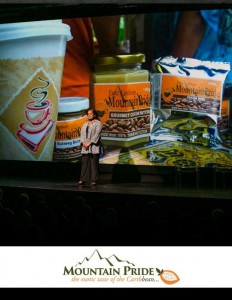Exotic Caribbean Mountain Pride bringing Trinidadian tradition to new frontiers.
The business that now exists as Exotic Caribbean Mountain Pride sprang from a cocoa estate in Trinidad and Tobago, when the family running the property were seeking a way to generate additional income outside of what was coming in via sale of the estate’s raw materials – cocoa beans.
The family began by reaching back into the estate’s history to restart a chocolate-m aking tradition that had begun among the estate’s slave labor population. The chocolate made by the slaves had never been sold as a commercial product and it was no longer available in the local market.
aking tradition that had begun among the estate’s slave labor population. The chocolate made by the slaves had never been sold as a commercial product and it was no longer available in the local market.
But once it began selling in 2007, Astrida Saunders, who co-owns the estate with her brothers, knew they were on to something big.
“There were not many people locally that were doing anything with cocoa beans at that time,” she said. “We were one of the pioneers into trying to get something more from cocoa than selling and exporting the beans.”
The business initially sold the chocolates – shaped in the form of a cocoa pod or fruit – to local souvenir shops. It was a home-based souvenir business at first, but the buzz surrounding the products soon grew and ultimately drew the interest of local supermarkets interested in getting involved.
Various ministries soon got word of the products as well, which prompted orders from the government to have the products available for island-based events such as conferences and trade shows.
“It was almost immediate that the traditional chocolate became an item,” Saunders said. “I was a bit surprised, because it started off as just sort of a hobby to earn some extra income. And it has turned into a business. It has grown beyond the hobby stage.”
And with that growth came the realities of meeting additional demand.
“We had to think up ways and means by which we could produce at a faster rate,” she said. “As a hobby, you use home-based equipment, but once we started to look at supermarkets we had to think about commercial equipment that could be adapted to manufacture at a faster rate.”
Seven years later, the company still works out of a small workshop, but it’s totally mechanized and capable of producing the required products in a timeframe that corresponds with demand. More distribution beyond Trinidad’s borders – across the Caribbean and even into the United States – has come in the last year or so, making the enterprise a little more substantial.
The workshop in Santa Cruz, about 60 kilometers from the estate. Working from Santa Cruz, she said, provides easier access to the markets for distribution. A new facility could be on the horizon soon, however, because Saunders said “we are almost at a maximum” in terms of what can be accomplished production-wise in the existing set-up.
But because the product is traditional, not generic, the growth will not be at all costs.
 “We’re hoping to have a factory. That is the aim and mission,” Saunders said. “We have outgrown our place and we’re looking at properties, looking at places where we can have a bigger workshop. A place to fulfill the orders and keep the quality and standards. We want to commercialize and industrialize. But what we’re doing is a traditional taste, so we don’t want our taste to become a commercialized taste.”
“We’re hoping to have a factory. That is the aim and mission,” Saunders said. “We have outgrown our place and we’re looking at properties, looking at places where we can have a bigger workshop. A place to fulfill the orders and keep the quality and standards. We want to commercialize and industrialize. But what we’re doing is a traditional taste, so we don’t want our taste to become a commercialized taste.”
The main product is still the traditional chocolate, though the company has done research into how to produce other items that has generated positive feedback. Saunders drove an initiative that’s added cocoa butter to the product line, as well edible chocolates and a flavored liqueur.
“It was a quest for knowledge,” she said. “If something is made, there has to be a process. Actually finding out the process is difficult, because it wasn’t actually done here locally or there wasn’t a school to tell you ‘OK, it is done this way’ or ‘It is done that way.’ So it was trial and error and very costly, buying machinery that didn’t work and buying again.
“I think I can build on it now, because I do know how it is done.”
Saunders soaked in some additional knowledge as part of her participation in WEAmericas (Women’s Entrepreneurship in the Americas) program, which leverages public-private partnerships to increase women’s economic participation and address three key barriers women confront when starting and growing SMEs: access to training and networks, access to markets and access to finance.
Program partners provide training and mentoring to women entrepreneurs throughout Latin America and the Caribbean, with a focus on business growth; support market access initiatives in countries throughout the region; and launch and expand initiatives to facilitate women-owned SMEs’ access to credit and other financial services.
“They do wonderful work with women in third-world countries, like ours,” she said. “I have been invited to two international programs, in Chile and Argentina, and they were very informative. I’m very grateful to have been given the opportunity.”
 The company’s chocolates mirror the products traditionally available in the Caribbean region before the advent of mass-produced chocolate powders. When that occurred, the traditional means of producing the products were lost, and the younger generations are now being reintroduced to the original flavor of hot chocolate flavors.
The company’s chocolates mirror the products traditionally available in the Caribbean region before the advent of mass-produced chocolate powders. When that occurred, the traditional means of producing the products were lost, and the younger generations are now being reintroduced to the original flavor of hot chocolate flavors.
“People really, really love that,” Saunders said. “Apart from the fact that people are going all-natural or all-organic, and this product is an all-natural product. This is what, as a child, we knew.”
Saunders said people in her local community in Santa Cruz participate weekly in the chocolate cafe where they come together on Saturdays and drink traditional cocoa tea, which is made from shaving the cocoa pod and brewing the shavings into a beverage as well as sample and purchase other products made by the company.
“It is rewarding to see the expressions on their faces when they drink the product,” she said.
Saunders’ older brother and her two daughters each work in the business, along with three non-family members in production and packaging. It has remained that way in order to protect the traditional family recipes, she said. The would-be expansion in a year’s time would necessitate the addition of even more machinery and more personnel, but she said a project of that scale would not be something that could easily be copied.
Within five years, she’s expecting a more sizable international presence – and a significant volume increase for the cocoa butter product in particular.
“The growth is only due to the demand,” she said. “There is a demand locally and there is a demand internationally, and we want to be able to fit that demand. People are requesting the product out there and we want to get it out there. The quality is really great.
“A year ago it was a project. And I’m happy to say that the project has evolved into the business.”
____________________
AT A GLANCE
WHO: Exotic Caribbean Mountain Pride
WHAT: Manufacturer of traditional chocolates and cocoa products
WHERE: Trinidad and Tobago
WEBSITE: Exotic Caribbean Mountain Pride
PREFERRED VENDORS:
exporTT




 This information will never be shared to third parties
This information will never be shared to third parties